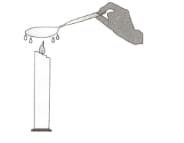EASY
8th Foundation
IMPORTANT
Earn 100
Read the given statements and select the correct option.
Statement 1: Kerosene oil and wood do not catch fire on their own at room temperature.
Statement 2: A combustible material cannot catch fire as long as its temperature is lower than its ignition temperature.
(a)Both statements and are true and statement is the correct explanation of statement .
(b)
Both statements and are true but statement is not the correct explanation of statement
(c)
Statement is true and statement is false.
(d)Both statements and are false.
50% studentsanswered this correctly

Important Questions on Combustion and Flame
MEDIUM
8th Foundation
IMPORTANT
EASY
8th Foundation
IMPORTANT
EASY
8th Foundation
IMPORTANT
MEDIUM
8th Foundation
IMPORTANT
Match column I with column II and select the correct option from the given codes.
| Column I | Column II |
| P. Rusting | (i) Explosion |
| Q. Burning of paper | (ii) Spontaneous combustion |
| R. Sodium | (iii) Rapid combustion |
| S. Fire crackers | (iv) Slow combustion |
EASY
8th Foundation
IMPORTANT
EASY
8th Foundation
IMPORTANT
(i) Calorific value of liquid and gaseous fuels is higher than solid fuels.
(ii) Liquids and gaseous fuels have higher ignition temperatures than solid fuels.
(iii) Liquids and gaseous fuels are easier to store since solid fuels occupy a lot of space.
(iv) Liquids and gaseous fuels burn completely, leaving no residue.
The correct advantages are:
EASY
8th Foundation
IMPORTANT
A spoon is kept in contact with ice cubes for some time. Later, the same spoon was held over the flame of a small candle. The observation is shown in the figure. What do you infer from the given figure?

EASY
8th Foundation
IMPORTANT
I. Yellow flames are ideal for heating.
II. The substances which vaporise during burning give flames.
III. Luminous zone contains unburnt carbon particles.
IV. The non-luminous zone has the highest temperature.
